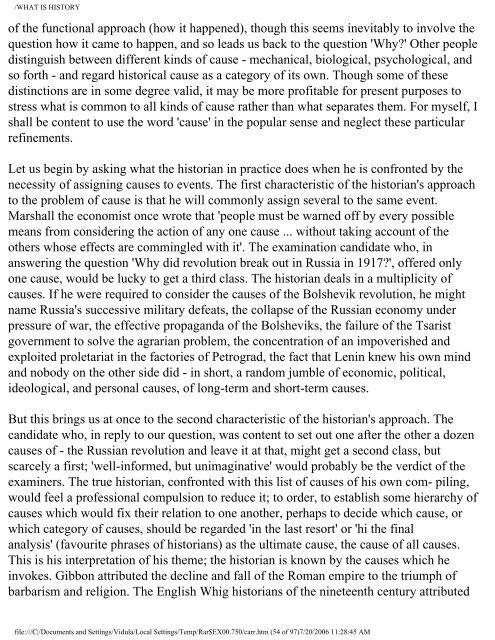What is History / by Edward Hallett Carr - Universal History Library
What is History / by Edward Hallett Carr - Universal History Library
What is History / by Edward Hallett Carr - Universal History Library
Create successful ePaper yourself
Turn your PDF publications into a flip-book with our unique Google optimized e-Paper software.
WHAT IS HISTORY<br />
of the functional approach (how it happened), though th<strong>is</strong> seems inevitably to involve the<br />
question how it came to happen, and so leads us back to the question 'Why?' Other people<br />
d<strong>is</strong>tingu<strong>is</strong>h between different kinds of cause - mechanical, biological, psychological, and<br />
so forth - and regard h<strong>is</strong>torical cause as a category of its own. Though some of these<br />
d<strong>is</strong>tinctions are in some degree valid, it may be more profitable for present purposes to<br />
stress what <strong>is</strong> common to all kinds of cause rather than what separates them. For myself, I<br />
shall be content to use the word 'cause' in the popular sense and neglect these particular<br />
refinements.<br />
Let us begin <strong>by</strong> asking what the h<strong>is</strong>torian in practice does when he <strong>is</strong> confronted <strong>by</strong> the<br />
necessity of assigning causes to events. The first character<strong>is</strong>tic of the h<strong>is</strong>torian's approach<br />
to the problem of cause <strong>is</strong> that he will commonly assign several to the same event.<br />
Marshall the econom<strong>is</strong>t once wrote that 'people must be warned off <strong>by</strong> every possible<br />
means from considering the action of any one cause ... without taking account of the<br />
others whose effects are commingled with it'. The examination candidate who, in<br />
answering the question 'Why did revolution break out in Russia in 1917?', offered only<br />
one cause, would be lucky to get a third class. The h<strong>is</strong>torian deals in a multiplicity of<br />
causes. If he were required to consider the causes of the Bolshevik revolution, he might<br />
name Russia's successive military defeats, the collapse of the Russian economy under<br />
pressure of war, the effective propaganda of the Bolsheviks, the failure of the Tsar<strong>is</strong>t<br />
government to solve the agrarian problem, the concentration of an impover<strong>is</strong>hed and<br />
exploited proletariat in the factories of Petrograd, the fact that Lenin knew h<strong>is</strong> own mind<br />
and nobody on the other side did - in short, a random jumble of economic, political,<br />
ideological, and personal causes, of long-term and short-term causes.<br />
But th<strong>is</strong> brings us at once to the second character<strong>is</strong>tic of the h<strong>is</strong>torian's approach. The<br />
candidate who, in reply to our question, was content to set out one after the other a dozen<br />
causes of - the Russian revolution and leave it at that, might get a second class, but<br />
scarcely a first; 'well-informed, but unimaginative' would probably be the verdict of the<br />
examiners. The true h<strong>is</strong>torian, confronted with th<strong>is</strong> l<strong>is</strong>t of causes of h<strong>is</strong> own com- piling,<br />
would feel a professional compulsion to reduce it; to order, to establ<strong>is</strong>h some hierarchy of<br />
causes which would fix their relation to one another, perhaps to decide which cause, or<br />
which category of causes, should be regarded 'in the last resort' or 'hi the final<br />
analys<strong>is</strong>' (favourite phrases of h<strong>is</strong>torians) as the ultimate cause, the cause of all causes.<br />
Th<strong>is</strong> <strong>is</strong> h<strong>is</strong> interpretation of h<strong>is</strong> theme; the h<strong>is</strong>torian <strong>is</strong> known <strong>by</strong> the causes which he<br />
invokes. Gibbon attributed the decline and fall of the Roman empire to the triumph of<br />
barbar<strong>is</strong>m and religion. The Engl<strong>is</strong>h Whig h<strong>is</strong>torians of the nineteenth century attributed<br />
file:///C|/Documents and Settings/Vidula/Local Settings/Temp/Rar$EX00.750/carr.htm (54 of 97)7/20/2006 11:28:45 AM







